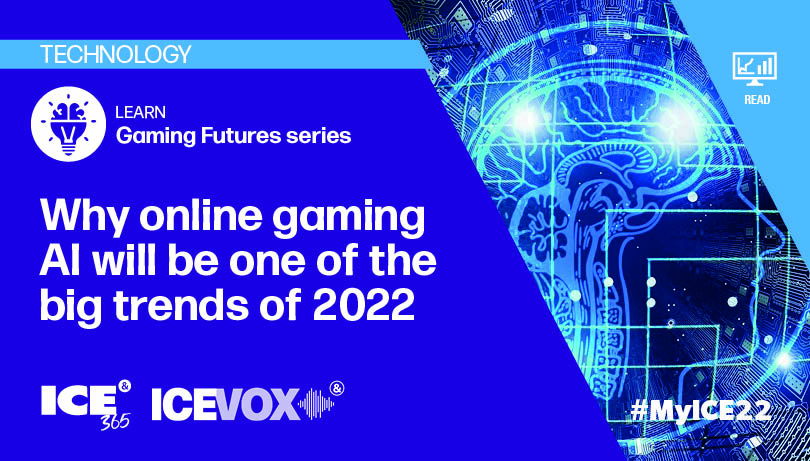Why online gaming AI will be one of the big trends of 2022

In its relatively short existence, the field of data science and artificial intelligence (AI) has changed beyond recognition.
Go back only a few years and what used to take days, now takes minutes, sometimes seconds – or can even be done in realtime. Worries about scalability, computer and storage limits no longer exist. What used to inconceivable is now readily possible.

This has paved the way for a move from reactive to proactive and 2022 will be the year that we see it become mainstream in the igaming industry.
A new opportunity
AI and the mining of data delivers marked improvements across a range of metrics in key areas, from game performance, to player loyalty, to responsible gambling. It can also be done at the speed of cloud, using platforms like Microsoft Azure.
Companies like Betfair, Betfred, BTG, Blueprint and Gamesys are leading the way in this area, investing significant time and resource into online gaming AI.
Undoubtedly there’s a wider understanding of this too. In Future Anthem’s 2021 State of Online Gambling survey, 70% of respondents cited an ‘improved use of data’ as a key focus area for their business.
Furthermore, 80% said that their decisions are ‘at least somewhat data driven’. However, 17% said their data is ‘barely structured’ – meaning there’s plenty of organisations not taking advantage.
Time to shift the paradigm
With the increased emphasis on data, the industry is beginning to extract huge amounts of it – at Future Anthem alone, we have analysed 45 billion game spins and expect to increase that number by more than 50% in the coming 12 months.
But what can that information and level of detail tell us?
There’s no simple answer here. There are many answers.
When it comes to igaming, learning patterns in gameplay helps to understand and predict player behaviour and value.
For example, we extracted value from huge datasets for Betfred to surface and action insights into players’ journeys and behaviours on their online games. The result was Betfred’s players getting an even more tailored experience, with personalised game recommendations in CRM campaigns and later onsite.
Cluster behaviours and profiles to improve performance
A key component in achieving this is clustering, whereby subsets of data are classified and grouped by algorithms according to trends and similarities.
You can discover things like the average number of games individual players play; the times they play, on which days, and how many in a month; their average spins per session, and average stake per spin.
Acting on this data means that players will be retained for longer, as the experience is built around them and their individual preferences. A personalised offering is determined by their actions, and this can be adapted while they are playing.
Marketing is optimised to a far greater degree, driving ROI on acquisition budgets through tailored recommendations, promotions, and bonuses.
These data-led game performance insights can be applied to make product design improvements and better operational decisions around a host of areas, including R&D, roadmaps, portfolio management and launches.
It also makes online casino significantly safer.
Improving responsible gambling
The combination of having vast data and AI at your fingertips – and real-time analysis – means that detecting players at risk of problem gambling is far more effective, versus standard operator models, with interventions coming far sooner than self-exclusions. In-game information is passed into models in milliseconds to create instant recommendations.
A real-life example of applying data from a responsible gambling perspective was our research with Gamesys.
Alongside the operator 36 million gaming sessions were modelled – which involved more than two billion spins, across five million hours of gameplay on 368 games, from more than 800,000 players – finding no statistically significant correlation between player markers of harm and three structural game characteristics: volatility, return to player and hit rate.
The aim was to understand more about the impact of casino games on player markers of harm, with most previous research focused on players themselves.
Aspects of games, players, behaviours, and protection are often mythologised; deploying comprehensive machine learning models with significant amounts of data on gameplay gives a far truer picture.
The must-have growth ingredient
Trust in game data science and you will responsibly drive better, smarter outcomes, resulting in increased knowledge and improved gaming experiences.
As competition in established markets continues to increase and regulatory pressures tighten, it has never been more important to find commercial advantages, and to nurture customer bases ethically.
Having this embedded in your technology stack is a must-have growth ingredient for any casino or studio that wants to accelerate in 2022 and beyond.
A data scientist with a PhD in Machine Learning, with both postdoctoral and commercial research experience, Dr Edmond Mitchell has spent the last four years working with state-of-the-art cloud technology to solve complex big data problems such as building some of the first responsible gambling models.
